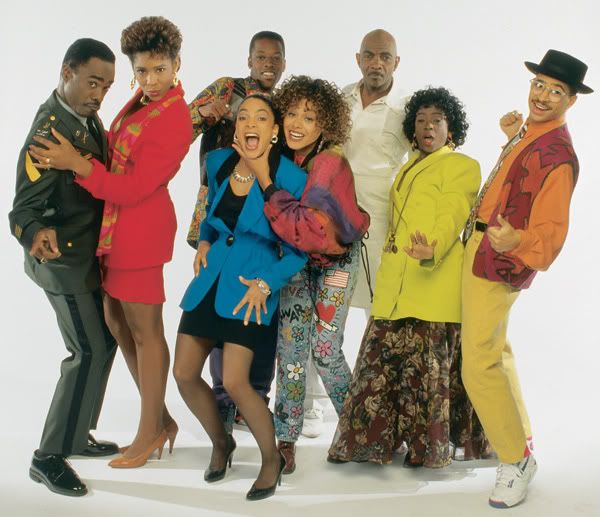The popular late 1980's African-American sitcom, A Different World, is what inspired me to attend college, particularly a historical Black college or university (HBCU). The comedy depicted the lives of several students attending the fictional Hillman College while exploring social issues, glamorizing Black sororities and fraternities, and giving an overall structure of college life. When high school drew nearer to a close, I made sure college applications were sent off and my college tour rounds were completed, because my dreams of freedom, partying, new friends and most importantly placing one foot forward toward my writing career, was becoming clearer.
Now the dust has settled (graduation) and a year later, I'm still struggling to find my footing, socially, emotionally and economically. Whitley Gilbert and Dwayne Wayne didn't mention this part. I was always so eager to become an adult because I always thought they had it...easier. I never had a problem with responsibility so I figured paying bills, would come easily; I was always a bit of a prude and uptight, so I felt confident about avoiding the wrong kinds of people; My childhood in my opinion was a bit of a choke hold, so I would finally be granted the freedom that I always desired; And lastly, I could stay up late! As I mentioned in two previous posts: Pursuit of Happiness and Forever Young, some of my peers, have started families, bought homes, jumped the broom, hell even divorced. All the signs of achieving (or failing) some form of adulthood. But what exactly defines an adult and who proposed the exact age that it should start?
Your 20's are like a 10-year period of experimentation. The self-examination stage. The reckless, defining, selfish, mistake inducing, extended developmental time in your life. Which was always defined to me as: "You're single, childless and GROWN, do whatever the fuck you want!" Especially because you have the rest of your life to set yourself on the straight and narrow. Something like what the Amish allow their adolescents to do, which is called Rumspringa. Adulthood in American society is built around this ideal: Go to college, get a job, marry, have children, and retire. The cycle repeats. But what about those who have a harder time kick starting this notion?
The New York Times reported on this growing phenomenon of 20-somethings unable to find their balance. An excerpt:
"The whole idea of milestones, of course, is something of an anachronism; it implies a lockstep march toward adulthood that is rare these days. Kids don’t shuffle along in unison on the road to maturity. They slouch toward adulthood at an uneven, highly individual pace. Some never achieve all five milestones, including those who are single or childless by choice, or unable to marry even if they wanted to because they’re gay. Others reach the milestones completely out of order, advancing professionally before committing to a monogamous relationship, having children young and marrying later, leaving school to go to work and returning to school long after becoming financially secure."
This "distinct life stage" is dubbed "emerging adulthood" by Dr. Jeffrey Arnett. As I read the 10-page report, one thought came to me: "Oh these spoiled American children," albeit I am one. My mother grew up in Jamaica during the 1960's and raised all three of her younger siblings when her mother migrated to the states. She was a mother, a big sister, a cook, a nurturer and a provider before she was 16. Would it be fair to say that her childhood was thwarted and she was forced into an adult role before she was emotionally capable? Of course. Because of my mother's abrupt childhood and early start in motherhood, she encourages me to enjoy my 20's. I also believe cultural and economic background are major factors.
"DURING THE PERIOD he calls emerging adulthood, Arnett says that young men and women are more self-focused than at any other time of life, less certain about the future and yet also more optimistic, no matter what their economic background. This is where the “sense of possibilities” comes in, he says; they have not yet tempered their idealistic visions of what awaits. “The dreary, dead-end jobs, the bitter divorces, the disappointing and disrespectful children . . . none of them imagine that this is what the future holds for them,” he wrote. Ask them if they agree with the statement “I am very sure that someday I will get to where I want to be in life,” and 96 percent of them will say yes. But despite elements that are exciting, even exhilarating, about being this age, there is a downside, too: dread, frustration, uncertainty, a sense of not quite understanding the rules of the game. More than positive or negative feelings, what Arnett heard most often was ambivalence — beginning with his finding that 60 percent of his subjects told him they felt like both grown-ups and not-quite-grown-ups."
Overall, I found the article insightful but amusing, especially when I'm one of the 20-somethings mentioned that is experiencing "a delay in achieving adulthood." Ultimately, the agreed upon version on markers of adulthood differs for most people. In my case, I thought a cool ass writing career, a sexy apartment, my own Dwayne Wayne and a comfy bank account would be all the "adulthood" I'd need. Obviously, I need to rethink it.
New York Times article link: What Is It About 20-Somethings?

No comments:
Post a Comment